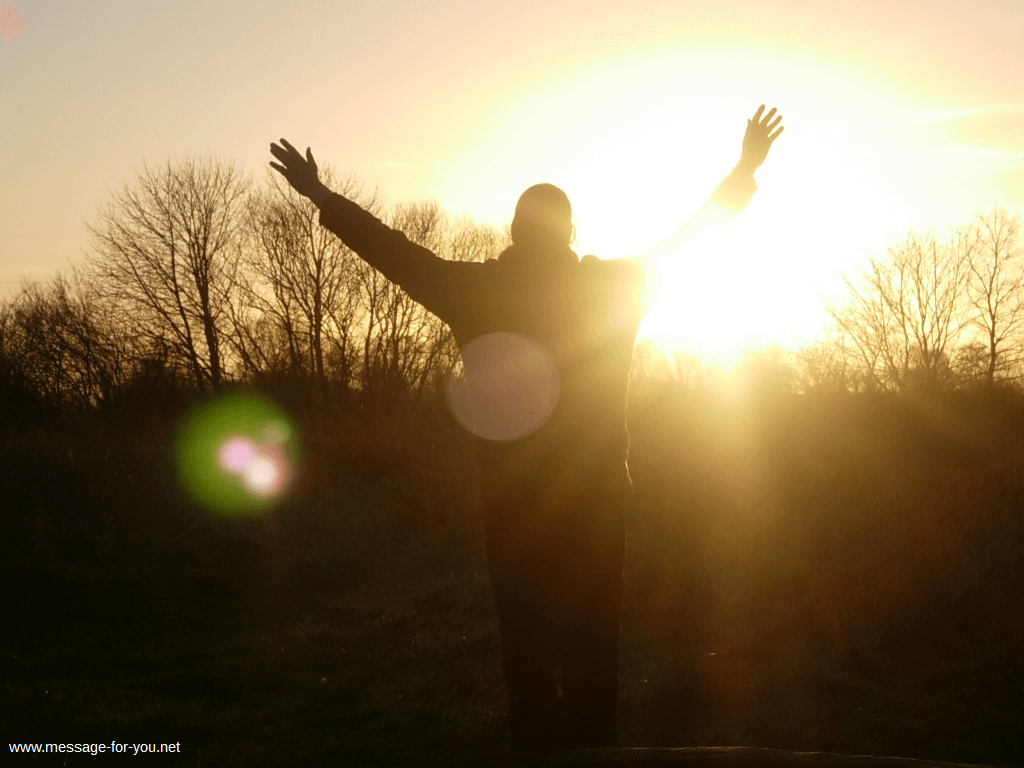Please first read:
Attention, the following translation has been automatically translated. The text may therefore contain errors. It is a temporary rough translation.
But you are free to share the text for non-profit purposes!

This article is one of the “4 steps on the path of discipleship”, see overview:
Next, I want to show you a cell phone. It stands for community. Jesus does not want you to be alone on your walk. He is with you, of course, but He also wants you to have contact with other followers of Jesus. That you talk to them, exchange ideas with them.
This third part is a lot longer than the other parts. This is because the topic of “community” is very broad and contains many other topics. That is why we only dealt with most of the other topics very briefly in it.
In the following you will learn what fellowship with other Christians is, why you need it and how you can find good fellowship.
“What is fellowship with other Christians?”
Fellowship with other Christians can be in a church. But it can also be a home group. Where you meet Christians at home and you read the Bible together, pray together etc.
It is very important to us that Christians worldwide can grow in their discipleship. We want to help Christians have fellowship no matter what their local situation is.
This website reaches people from almost every country in the world (see our subpage Website Statistics). People from countries where Christians are persecuted or from countries with other religions (e.g. Islam or Hinduism) are also reached.
In very many areas of the world there are no Christian churches or congregations at all or only “traditional churches” that are not (in substantial parts of their doctrine) based on the Bible.
Most of the time, Christians have no other choice but to meet in houses or outside in nature. Just like the Christians did in the first centuries. Maybe they even have to “meet underground” when there is persecution of Christians.
But also in the “Western countries” and also in Germany there are many regions where there are only very few churches at all. Or where there are only few churches/congregations that are founded on the Bible and e.g. give space to the work of the Holy Spirit or actively spread the Gospel.
Furthermore, we do not know if or when there will also be persecution of Christians in the so-called “western world”. Christians should therefore prepare themselves today to live out their faith in small groups (e.g. in houses or apartments).
The restrictions on church life within the church buildings during the Corona pandemic (from 2020) should be a warning to us.
What if the meetings in the buildings of the churches were no longer possible at all? How would the body of Christ then gather together and what would church life look like in those assemblies?
We also find many descriptions of the community life of the first Christians in the Bible.
“But why are there so many different Christian denominations today?”
Although all Christians agree that Jesus is our Savior, they often differ on individual questions of faith. This can be very confusing, especially for someone who is new to the faith. Already very early there were divisions among the believers, ie different teachings and great grievances, as can also be read in the letters of the apostles (e.g. in 1 Corinthians 1:10-17; 1 Corinthians 11:17-34; 1 Corinthians 14; Galatians 3:1-3; Hebrews 5:11-14). That’s why it’s so important to know the “beginnings” of Jesus’ teachings (see Hebrews 5:12). If you recognize what the basics were, then you see the “roots” so to speak and can orient yourself on them.
Even later, in the course of church history, much was mistakenly lost. You can also read more about this in an article on our website: Back to Basics – To Come – (A Brief Overview of Bad and Good Growth in Church History).
In the course of time, however, many churches, communities, associations, etc. have emerged. Because there are so many different Christian denominations, it is important to understand how early Christians had fellowship. Because the way this first community was, it should also be for us today (again).
“What was community for the first Christians?”
So let’s look at what God says in the Bible in the New Testament on this subject. In it we can read a lot about how the disciples of Jesus and the believers had fellowship with one another. And that also shows us what “church” or “congregation” should look like according to God’s heart. Let’s take a closer look:
Jesus is the rock
When Jesus spoke to Simon Peter, He said:
“And I say to you also: You are Peter, and on this rock I will build my church,and the gates of the dead shall not prevail against them.”
(Matthew 16:18 NLT)
Not only in this but also in other Bible passages it is clear that Jesus is the rock and thus also the foundation of the church (see Romans 9:33; 1 Corinthians 10:4; 1 Peter 2:8). And no one can lay a foundation other than that which is laid: Jesus Christ (cf. 1 Corinthians 3:11). And if the church is built on anything other than Jesus and His words, then it will not stand (cf. Matthew 7:24-29).
Jesus said so in His statement to Peter. But we understand His statement better if we look at the sentence in the original Greek text. Because Jesus uses a play on words in the Greek language in this sentence! The Greek word “Petros” means “stone”. But the Greek word “Petra” means “rock” or “big stone”.
It is not uncommon for Jesus to speak in the third person when speaking of the rock as Himself. He also uses this form of speech in many of His other statements, for example when He spoke about Himself as the Son of man (see Matthew 24:27) or as the Son of God (see John 3:14-21). But Jesus also spoke about Himself in the first person, eg He said “I am the bread of life” (cf. John 6:35) and other “I am” words. In His words to Peter, Jesus could therefore have said differently: “I am the rock and on you, a stone, I want to build my church.”
John 1:42 describes how Peter came to Jesus. Jesus said to him, “You are Simon son of Jonah, your name shall be Cephas.” The word “Kephas” is Aramaic and means “a stone”.
This becomes even clearer when we realize that all other believers are also seen by God as “living stones”:
That Jesus is the Rock and the Foundation means that it is not about differences in doctrine, but about His Word and His Truth. It means that Jesus is the head of the church and that He Himself sustains and sustains His church. And it means that only the works He has prepared for us stand on it. It also means that our salvation does not spring from a particular church affiliation, but from Jesus himself. Our salvation comes from surrendering our lives to Jesus and not from “being Christian on paper”.
Jesus further said to Peter:
“And I will give you the keys of the kingdom of heaven; and what you bind on earth will be bound in heaven; and what you redeem on earth will be redeemed in heaven.”
(Matthew 16:19 NLT)
The key that Jesus spoke of was not unique to Peter. This key refers to the authority that Jesus confers on every Christian: For example, the authority to cast out demons and to heal diseases (see Mark 16:17-18). So this applies to all Christians, not just individual leaders or ministries.
But the fact that Jesus addressed these words specifically to Peter has another meaning. Peter was the first to address the non-believers at Pentecost (Acts 2:14-36), who were converted (cf. Acts 2:37-47). That was the official birth of the church. Like the other first apostles, Peter was like “pillars” on the foundation (Jesus) on which the first church was formed.
And we are His living stones
In 1 Peter 2:4-10 all believers are referred to as “living stones” which together form a “spiritual house”:
“So now you also are being built up as living stones, as a spiritual house, as a holy priesthood, to offer up spiritual sacrifices acceptable to Godare through Jesus Christ.”
(1 Peter 2:5 SLT)
This “spiritual house” is the worldwide church of all Christians, founded on Jesus, the foundation (see also Ephesians 2:19-22).
The “spiritual sacrifices acceptable to God” primarily refer to ourselves (see Romans 12:1). But that includes good works. However, this does not mean a religious achievement through self-effort, nor that our salvation would depend on the works. We are saved by faith, not works, lest anyone should boast (cf. Ephesians 2:8-9). It refers to the works that “God prepared beforehand, that we should walk in them” (see Ephesians 2:10). They are, so to speak, the “building blocks” that God is calling each individual to be. But if we build works of our own imagination or effort, not called to do so by God, then they are like building blocks made of wood, hay, or straw that will not last (cf. 1 Corinthians 3:12-23). It also says aptly in Psalm 127:1: “Unless the Lord builds the house,
Each of us can ask God what His “building blocks” are that He wants to give us. The Holy Spirit gives us His power to do this. It is not too difficult that we cannot bear His duties (cf. Matthew 11:28-30). Jesus wants to help us with this, because he himself is the master builder.
“What does ‘congregation’ or ‘church’ actually mean?”
For a “Christian” is not someone who has been raised or culturally raised to be one. Rather: Christians are those who have made a conscious decision for Jesus in their lives.
We mainly use the term “communion” as it describes different types of encounters with Christians. However, one can also differentiate between “the body of Christ” and “individual congregations”. More on that in a moment.
The body of Christ
All believers worldwide are also referred to as the body of Christ (cf. 1 Corinthians 12:12-27; Romans 12:4-5; Ephesians 4:7-16). This is a picture of our spiritual unity in Jesus. In Ephesians 4:1-6 it says:
“I urge you therefore, I, who is bound in the Lord, to walk worthy of the calling to which you have been called, with all humility and meekness, with longsuffering, bearing with one another in love, and diligently seeking the unity of the To keep spirit through the bond of peace: one body and one spirit, as you are also called to one hope of your calling; one Lord, one faith, one baptism; one God and Father of all, above all and through all and in all of you.”
Jesus prayed for His disciples and for all Christians worldwide that we would recognize and live in our unity (cf. John 17). But it is a spiritual unity that is based solely on Jesus and His words (see also the section “Jesus is the Rock” earlier).
You can also read more about unity in the article “What is unity?” (To come) read more about it.
Individual local churches
In addition to the body of Christ as a worldwide church, there are also individual churches or local churches. These are the individual meetings of Christians. In the following we see what these looked like among the first Christians.
The Heavenly Family
Anyone who has surrendered their life to Jesus is spiritually born into the heavenly family. This means that we Christians are all brothers in spirit and we have the same Father, God.
“Family” also means that all family members belong and no one is cast out or disadvantaged. Even in the days of the disciples, when women were often oppressed in society, Jesus treated them with respect (see, for example, John 4:1-42; Luke 7:36-50).
And Jesus also said about the children that the kingdom of heaven should not be denied them (see eg Matthew 18:1-14; Matthew 19:13-15; Matthew 21:15-16). If someone has children, then they can also be present in a meeting. However, the children should not be forced to join the community if they do not want to be part of it, because free will also applies to them.
On the children ‘s page you will find several articles about and for children and faith.
“How often did the early Christians meet?”
The early Christians met one another very often. Most of them even “every day” (cf. Acts 2:44-47; Acts 5:42). There was no specific day of the week on which the believers should meet. Neither on the Sabbath nor on a Sunday (cf. Colossians 2:16-17). But the believers often taught on the Sabbath in the Jewish synagogue, because that’s where the Jews and Gentiles gathered who had not yet believed in Jesus as the Messiah (see Acts 13:14-52). So for the early Christians, the temple was largely a “mission site.”
“Where did the first Christians meet?”
So the believers were mainly in the temple in Jerusalem at first and also mainly in their homes (see Acts 2:44-47).
But as early as the Old Testament it was prophesied that the temple would be destroyed (cf. Daniel 9:25-27). And Jesus also announced this to His disciples (cf. Matthew 24:1-2). Later, after the temple was destroyed, the believers met mainly in their homes, except in public squares or other places.
Nowhere in the scriptures does it say that it is God’s will that a new temple be built. Even when Jesus returns, He will not sit in any temple (see Revelation 21:22). Instead, it says that our bodies are the temple of the Holy Spirit (cf. 1 Corinthians 3:16; 1 Corinthians 6:19; Ephesians 2:19-22). And that we are “living stones” (cf. 1 Peter 2:5). When Jesus died on the cross, the veil of the Holy of Holies in the temple was rent (cf. Mark 15:37-38). Jesus cleared the way in God’s presence. That is the great difference in the new covenant. It would therefore no longer make sense to build a new temple with the holy of holies, sacrificial altar, etc. God wants to dwell in His children, not in a building.
And Paul taught for 2 years in a school to train other Christians there (see Acts 19:8-10).
“How long did a meeting/communion of the first Christians last?”
A meeting of the first Christians probably lasted different lengths of time. There is no instruction anywhere in the New Testament as to how long a meeting should last. But since the Christians were open to the workings of God, it can be assumed that they also let the Holy Spirit guide them for the duration of a meeting. There had to be enough time for each individual to get involved. More on that later.
When Paul preached, it even lasted several hours (see Acts 20:6-12). But such a long speech did not happen regularly in a meeting, but was part of his business trip.
“How many people were there in a community of early Christians?”
To do this, we first want to answer another question: “When does one actually speak of a ‘congregation’ or ‘community’?”
Jesus said:
“For where two or three are gathered in my name, there am I in their midst.”
(Matthew 18:20 NLT)
Jesus rejoices when we gather in His name to fellowship with one another and with Him. So he places himself in a community, even if it is still small. He also said: “Fear not, little flock; for it pleased your father to give you the kingdom.” (Luke 12:32 SLT). Jesus spoke these words to His disciples at a time when the church did not yet exist in the form it did later after Pentecost. He encouraged them because He values beginnings. We, too, are not to despise the “small beginnings” (cf. Zechariah 4:10).
For the first 12 disciples whom Jesus called, He lived the life with God and fellow human beings. Other people also followed him. These first disciples were, so to speak, the “forerunners” of the later church. They were thus taught by Jesus what church should mean.
After Jesus was resurrected and returned to heaven, the disciples, at His direction, met in an upper room to pray. At that point there were about 120 people (see Acts 1:15). That was also a “forerunner” of the community that was to come into being because the Holy Spirit had not yet come upon it. But then, at Pentecost, they all received the power of the Holy Spirit, and through Peter’s speech, about 3,000 people were converted that day. In fact, Acts 2:47 says, “The Lord added to the church daily those who were saved“.
Now, one might think that that was a significant number of “congregational members.” But this church was the regional church as a whole, out of which several individual churches grew. This first congregation therefore spread explosively not within, but outwards: several congregations arose from this, which met in the houses. The actual growth was not in the number of members, but in the multiplication of the individual congregations. Because the believers divided up by meeting with each other in different houses. When people converted to Jesus, they didn’t join a single church, but one of the churches in the houses.
The “church” at large (the body of Christ) grew through evangelism and discipleship: new believers came in, they were discipled by other believers to disciple other believers in turn, etc. Persecution of
Christians did too Part of the fact that the Christians spread rapidly. The Jews and Romans persecuted the Christians, who scattered as a result and continued to spread the faith in other places and also in other countries.
This fruitful multiplication of Christians was suppressed only a few centuries later by the then established state religion. In this state religion, the power structures of the Roman Empire, pagan customs and Christianity (into which false teachings had already crept in) were mixed together.
This resulted in unfruitful church structures, parts of which we can still see today (a good 500 years after the Reformation). During the Reformation, not all areas of church life or Christian life were actually reformed.
Some topics such as the gifts of the Holy Spirit were only “rediscovered” much later, i.e. They were practiced by a larger part of Christians only much later. The Reformation is still going on and many Christians and churches worldwide are on the move to bring in the great harvest of souls. Because Jesus wishes that still a lot of people would be saved before He comes back.
For the number of believers in a single (!) community, as the first Christians had, it does not mean “bigger is better”, but: “less is more”. And: “Everyone has something”. More on that in the next section.
“What did the early Christians do?”
“Everyone have something” which refers to spiritual gifts and ministry. Everyone could get involved. That means, for example, that you talk about current and personal prayer requests and build each other up. In such a community one could also pray for one another and serve one another without there being no more time for individuals. At such times every Christian can experience Jesus and grow spiritually.
They were led by the Holy Spirit
In the first place, the Holy Spirit is the leader of the assembly. This means: For the first Christians it was normal that each of them could personally hear God’s voice. Jesus also said that He is the Good Shepherd and that His sheep hear His voice (cf. John 10:27). A flock of sheep must also be able to follow the shepherd or recognize when he is leading them. The believers paid attention to what the Holy Spirit was saying to each of them and what He wants to do in the community. And there should also be room for the Holy Spirit to work. In 2 Corinthians 13:13 it even says: “The communion of the Holy Spirit be with you all”. He was seen for the person He is: the third person of the Trinity, the Lord (see 2 Corinthians 3:17-18). When making decisions, care was taken where the Spirit of God leads. A letter from the apostles even says: “It was pleasing to the Holy Spirit and to us…” (cf. Acts 15:28).
They had God-appointed leadership and ministries
Also in the election of leaders and ministries, attention has been paid to how the Holy Spirit has called each one. The worldly status was not respected or called after the worldly education, but whether the person had the necessary spiritual gifts, the spiritual maturity and a speaking from God (see Acts 6:1-7; Acts 13:2-3 ).
God calls Christians to various ministries (cf. 1 Corinthians 12:12-31). He calls some believers to be apostles, prophets, evangelists, shepherds, and teachers (cf. Ephesians 4:11-16). He also calls overseers/rulers/bishops/elders (cf. Philippians 1:1; Titus 1:5-9) and deacons/ministers (cf. Acts 6:1-7; Philippians 1:1; 1 Timothy 3:8). -13; terms depending on Bible translation). There is no description of the duties of the shepherds in the New Testament. They are most likely intended to have a pastoral function (see also Jeremiah 3:15; Ezekiel 34:1-31).
The functions of the services are (very briefly) described in the…
Apostles : They plant new churches and make disciples and train other Christians to plant churches and make disciples.
Prophets : They pass on God’s words and train other Christians to hear God’s voice personally.
Evangelists : They proclaim the message of Jesus and train other Christians to reach people with the gospel.
Shepherds : They help newly converted and still underage Christians (“lambs”) with pastoral care to mature and train other Christians to take care of them pastorally.
Teachers : They teach biblical truths and train other Christians how to live and teach the subjects practically.
overseers/superintendents/bishops/elders: They correct the assembly (e.g. wrong teachings, prophetic impressions etc.) and train other Christians in spirit discernment.
But not only these, but all Christians present must be able to test, see also 1 Corinthians 14:29, 1 John 4:1-6 and 1 Thessalonians 5:20-22.
Deacons/Servants : They are responsible for providing care (help such as food distribution) among the poor, orphans and widows (today possibly also among forced prostitutes, refugees, migrants, etc.) and train other Christians in diaconal helpfulness.
There may be several of these ministries in a community. In Ephesians 4:11-16 they are all in the plural. Of the apostles, too, there were not only the 12 first apostles whom Jesus had called, but later a number of others who were called by God to serve as an apostle, as is also evident from Ephesians 4:11.
However, it is possible that not all of these ministries are present in a community because, for example, the Christians in it were not called by God to all ministries. More services may be added as the community grows. Or it can also happen that what God has called each individual to do only gradually emerges.
There were also women in these ministries. A few examples: Phoebe was a deaconess (cf. Romans 16:1-2). The couple Priscilla and Aquila were co-workers with the apostles and had a church in their home (cf. Acts 18:2, 18, and 26; Romans 16:3-5; 1 Corinthians 16:19). It speaks of the women Tryphena, Tryphosa (see Romans 16:12), Mary (see Romans 16:6) and Persis (see Romans 16:12), who also did much work for the kingdom of God .
In addition to His disciples, Jesus also had female disciples who followed Him and served Him (see Luke 8:1-3). Women can and should also teach, prophesy and serve in all other spiritual gifts, just like men. For in Christ there is now neither male nor female, but a new creation, namely as children of God (see Galatians 3:26-28; 2 Corinthians 5:16-17).
God is still distributing these ministries today! The task of all these ministries is to equip the body of Christ. That means building up in faith and training for spiritual maturity, as is also stated in Ephesians 4:11-16. None of the leaders or ministries should oppress others, but in the humility and love of God build up and help to grow spiritually. Jesus Himself set this example for His disciples when He symbolically washed their feet (cf. John 13:1-16). Also, each Christian is to submit to one another (cf. 1 Peter 5:5; Ephesians 5:21).
It is important that every Christian takes the time to ask God personally what his calling is. You can also find explanatory articles on the subject of vocation on our website, for example in the article “How do I find my calling?” (in German). There is an overview with further articles on the subject.
If a Christian is not called by God to any of these ministries, then he has another calling from God (eg in the professional world, in the family, in the mission, in the traveling ministry, etc.). He can and should still contribute with the (spiritual) gifts from God. More on that under the next heading.
They were able to contribute their (spiritual) gifts
In addition to the ministries to which God chooses each individual, there are also the gifts of grace/spiritual workings/spiritual gifts or gifts of the Holy Spirit (see 1 Corinthians 12-14). God continues to bestow these spiritual gifts today. Like the ministries, they will not end until Jesus returns (cf. 1 Corinthians 13:8-13).
A (very brief) description of the gifts of the Spirit:
Word(s) of Wisdom : With this gift, a Christian can speak or act with wisdom in a situation that he does not have from himself but from God. And he can also help other Christians with teaching in this gift.
Word(s) of knowledge : With this gift, a Christian can get information from God about a situation that he himself did not know. And he can also help other Christians with teaching in this gift.
(The difference to the gift of wisdom: The gift of wisdom, on the other hand, helps to deal correctly with the information or a situation that the Christian already knows from the natural.)
Faith: A Christian with the gift of faith has a firm belief that something specific is coming from God. And he can also help other Christians with teaching in this gift.
Healing Gifts/Healing Gift : A Christian with the gift of healing ministers to the sick with the laying on of hands to a greater degree. And he can also help other Christians with teaching in this gift.
Effects of Miracles/Miracles : A Christian with the gift of miracles expects and experiences various miracles from God. And he can also help other Christians with teaching in this gift.
Divination/Prophecy/Prophetic Speech: A Christian with the gift of prophecy receives God’s speaking to a greater degree and passes it on to others. And he can also help other Christians with teaching in this gift.
Spirit Discernment : A Christian with the gift of spirit discernment perceives the spiritual atmosphere and recognizes the spirits as coming from God. And he can also help other Christians with teaching in this gift.
Different Types of Tongues/Tongues : A Christian with the gift of tongues can speak or pray in a new language given to them by God that they have not learned themselves. And he can also help other Christians with teaching in this gift.
Interpretation of tongues/tongues: A Christian with the gift of interpreting tongues can receive the interpretation or message of speaking in tongues from God. And he can also help other Christians with teaching in this gift.
Every Christian may already have received one or more of these gifts from God. But God still encourages us to strive after the gifts (cf. 1 Corinthians 12:31; 1 Corinthians 14:1; 1 Corinthians 14:12). Because the Holy Spirit distributes these gifts, but at the same time He wants us to ask Him for them. We may ask Him for more gifts. If that weren’t the case, then we shouldn’t be striving for it.
So every Christian can serve in all gifts, even if he has a few gifts with greater emphasis! And those gifts, in which he serves more frequently, are part of his calling.
Other gifts from God:
Besides the spiritual gifts, God also bestows other gifts mentioned in 1 Corinthians 12:12-31 and Romans 12:3-8. These gifts are also about spiritual abilities given by God. It is not (!) about naturally learned knowledge, such as worldly education etc. Although some of these gifts, such as mercy, may already have been given by God “in the womb”, but it is nothing that man can do of his own human nature effort itself has learned.
Ministry in the Gift of Miracles
Ministry in the Gift of Healing
Ministry in the Gift of Helping
Leadership
Ministry in Different Tongues
Admonition
Generosity
Mercy
You can also include the following gifts:
Hospitality
You can also find other articles in audio and text form on the subject of spiritual gifts on our other website Prophetenschule.org under The Work of the Holy Spirit (in German).
“And what about fellowship with unbelievers?”
Unfortunately, in some circles, believers are advised to cut off all “contact with the world.” Sometimes even to their own family members. And that is exactly what is wrong. Jesus did not tell us followers to hide and shield ourselves from the world. Instead, His words are unmistakably clear:
“You are the salt of the earth. But if the salt becomes insipid, with what shall it be made salty again? It’s good for nothing more than being thrown out and trampled on by people. You are the light of the world. A city situated on a mountain cannot remain hidden. Nor does one light a candle and put it under the bushel, but on the candlestick; so it shines to all who are in the house. Let your light shine before people so that they may see your good works and glorify your Father who is in heaven.”
(Matthew 5:13-16 NLT)
We Christians are like salt with which this world is seasoned with the kingdom of God. Just as soup is not tasty without salt, this world would be without God.
The salt is also sprinkled in a good dose in a meal. If salt is stored for a long time in high humidity, then it clumps. In the same way, we should let God scatter us into the world like salt shakers and not just stay with each other.
God Himself makes us “palatable” and gives us flavor.
Even though we are in this world, we are not of the world. This means that God’s standards apply to us and not the standards of the world (see Romans 12:1-2). It means that we are not to become one with sin (cf. 2 Corinthians 6:14-18). It takes wisdom from God when we face challenges at school, at work, or in a non-Christian family. This means, for example, not to participate in peer pressure, bullying, fraud, gossip, etc. There are often other values in the world than Jesus exemplified for us.
Jesus taught us how to live in this world. He didn’t live in a monastery or only had contact with His disciples. No, He shows us how His dealings with the people of the world looked like: He was in the midst of the people and showed them God’s love. He spent His time with the outcasts, with the tax collectors, with the prostitutes, with the sick, with the poor and with the rich. He also went to feasts (cf. John 2:1-12). He also spoke to the Jewish scribes and Pharisees, but saw through their religiosity that they did not have God’s love within them (cf. John 5:39-42). Jesus always picked people up where each of them personally stood in order to reach their hearts.
He also wants to give us His wisdom and guidance to reach non-Christians with the gospel.
You can also find an overview of articles on the subject of evangelism on our website under evangelism articles.
“Why do I need fellowship with other Christians?”
First of all, it is important that fellowship with God comes first. Just as the Bible does not replace a relationship with God, neither does it replace fellowship with other Christians. That’s why:
Also cultivate your personal fellowship with Jesus
Also have personal fellowship with Jesus. Learn from him, recharge your batteries with him, enjoy the time with him. In Psalm 23:1-2 (SLT) it says:
“The lord is my shepherd; I will lack nothing.
He feeds me in green meadows and leads me to still waters.”
This verse also shows that Jesus wants to refresh us. Some things only the LORD himself can give us. For example the familiar time with him, in which you recognize him more and more. But also personal things that He wants to confide in you in the conversation. You also learn with him to be primarily dependent on him and to fill up with him.
Jesus is our friend and we are His friends. In a friendship you like to spend time together and get to know each other better.
In another article on our website , “How do I have a personal encounter with Jesus?” (in German) you can also find more about walking in the Spirit in God’s presence.
Now to the question of why we need fellowship with other Christians:
Earlier we saw a lot about how the first Christians lived out their faith. From this it can already be concluded why the community is important. So a short summary again:
Why you need fellowship with other Christians
You need fellowship with other Christians to learn from one another.
Because: You would (certainly) want to exchange ideas with others and ask them, for example: “What have YOU experienced with God?” or: “What does this and that mean in the Bible?” etc.
You need fellowship where you can train other Christians.
You need community in which you can live your ministry or your vocation (or sometimes just parts of your vocation).
You need community in which you can also serve others with the (spiritual) gifts of God.
You need fellowship where you can encourage and comfort other believers.
You need fellowship where you can pray with other Christians.
You need fellowship where you can worship God with your brothers and sisters.
And above all: You need community because it is your heavenly family.
(Even if it doesn’t look so heavenly.)
All these points are therefore also an encouragement for you in difficult times when things are not going so smoothly.
You also need fellowship with non-Christians
Of course, as I said before, you also need fellowship with people who don’t know Jesus yet. It would be unnatural for a family to keep to themselves but never have contact with other people.
The (spiritual) gifts, ministries and callings of God should not only be served within Christians, but also non-Christians.
“How do I find fellowship with other Christians?”
The best thing to do is to look around to see where there are other Christians in your town or in the area that you can meet up with. We would like to give you the tip that it is important that they have the Bible as a basis and that they are open to the Holy Spirit.
But the most important thing is that you ask God about it and let Him guide you.
Ask god
Ask God where and with whom you should meet. He can speak to you personally about it. He can also tell you a place or tell you the people.
As already mentioned, you will also find explanatory articles on this topic “God’s speeches” on our website, for example in the article “How does God speak? How can I personally hear His voice?” (in German). There is an overview with further articles on the subject.
People you already know
It may even be that there are already believing Christians in your environment that you know. For example in the family or relatives, but also in school, training, at work or in a club. Perhaps there will be conversations with these people and you will notice where they “stand in faith”, so to speak. God can show you whether you can meet up with one or the other more often.
Or start a church yourself, a home group, a Christian meeting, etc.
Let the Holy Spirit guide you
If you don’t hear anything concrete at first, then let the Holy Spirit guide you in your search for other Christians. It may be that you meet people along the way and it turns out that they are also followers of Jesus. But then also ask God if He has brought you together and if you can meet together from time to time.
Or use an internet search engine to look for a church, a home group, Christian meetings, etc.
You may also find a Christian forum or Christian chat or Christian video meeting (e.g. Zoom, Skype etc.).
You can also find helpful links at the end of the article.
“What if a community does not agree with other Christians on all points?”
But you may find that a community or individuals do not (that is, fundamentally) not correspond to how the first Christians lived their faith. So what to do if you can only grow a little spiritually in a community? For example, if you are not allowed to live out your spiritual gifts or your vocation because perhaps a leader or the mission statement of the community forbids it (against God’s will)?
Then you should definitely ask God if you should stay in the community. Ask Him personally and independently of human opinions. It is important what God says to you personally, especially in relation to the calling He has given you. As already said, His speech does not contradict the Bible and His character.
Did you get it clear from God to avoid a certain fellowship with other Christians? Then ask Him which Christians you should meet with instead.
Or did you get it clear from God that you should continue to stay in a certain community? Then there is a reason for that too. Then ask Him “why” you should be in this meeting. And what He wants you to do there. Sometimes His ways are not easy, and because of circumstances and attacks, it may appear just the opposite. And then you ask yourself if you’re still in the right place. That’s why it’s good if you know what He says to you personally about it. Where the “desert” is, God can show you the “oasis” in spirit. When you lose this vision, all you see is the desert. Therefore stand by what He has told you and shown you. Then you will also have more peace in times when things are difficult.
God does not want our callings and (spiritual) gifts to be suppressed. Nor does He want us to starve or die of thirst spiritually. That’s why you should also ask him where you can recharge your batteries spiritually. Ask Him to meet Christians who also want to grow spiritually. He can show you.
When God takes you into the wilderness to serve others, He gives you water too. The Holy Spirit is in you. And we all shouldn’t forget about drinking…
Also meet other “like-minded” Christians
Especially when you are in such a desert, it is helpful if you are still in touch with other Christians who are on the same spiritual wavelength as you. This means that as a Christian, for example, you have a ministry as an evangelist and it can therefore be encouraging to exchange ideas with other evangelists. There are certain struggles and challenges in every ministry that a Christian in another calling cannot always understand. Therefore it can help to exchange ideas with Christians who are on a similar “front”. As an apostle, Paul too was able to talk to the other apostles in his ministry about some things that he could not have discussed with the other Christians. It is the same in other ministries or callings: prophets can encourage other prophets, apostles can encourage other apostles,
There is no “perfect community”
We have now learned a great deal about how the early Christians lived in church.
See Bible verse Ephesians 5:27 The bride without spot or wrinkle
Does this mean that as Christians we have to be “perfect”? No, because only Jesus was perfect as a human being. And since He knows that we all have our faults and quirks, He doesn’t ask us to either.
But the basics, such as the first Christians had, should at least be largely in place.
Conclusion
Much more could be said about how the first Christians lived their faith. But that would be too much here. We therefore recommend that you read chapters 1-28 of the Acts of the Apostles in the New Testament in peace. In this one can see the practical faith well.
You can also read about other spiritual topics, such as the Lord’s Supper, prayer, worship and much more in the other books in the New Testament. But we can also read about faith in professional life, in everyday life, in family life, etc., how dealing with it looked like and should look like.
If you like, you can also look up all Bible passages in the New Testament with the term “one another”. You can simply use an online Bible with a search function on the Internet ( e.g. www.bibelserver.com ). Many of these Scriptures using the term “one another” are requests to us Christians how we should treat one another, eg “love one another”, “serve one another”, “forgive one another” and other statements. There are also a few passages about how we shouldn’t treat each other, eg don’t “betray one another”, “judge one another”, “bite and eat one another” and other statements.
Instead of “each other” you could also search for other terms like “mutual” etc.
We have written other articles on the topic of “congregation”, which you will find listed at the end of the article.
And for more articles on other topics, see the Discipleship Articles.
How could one describe “church” in just a few words? Or to put it another way: How could one represent “community” as a picture?
Take a moment to ask God about this. Maybe you will get a few sentences that you can formulate or a picture that you can paint. And because of “right” or “wrong”: Ask Jesus about it and let him show you how He sees His church.
Did you ask him and let him show you? Please read on here only afterwards…
If you have received something on this subject, you may be wondering whether it is right or wrong. It’s not about getting the exact same image as below. Because God can also show you something from a different perspective. The pictures can look as different as God works through His children. They are different pieces of the puzzle of God, but they form a whole puzzle.
And also straight to our image of community:
“Church” means the heavenly family of God’s children whose gifts and callings from God serve one another and the world in love. Church is a unit that is very broad: It may be that you are called by God in a certain area and your focus is therefore there. For example, a prophetic ministry may have more emphasis on the gift of prophecy than other areas. But all Christians serve with what they receive from God. Like a colorful radiant mosaic reflecting His glory. And Jesus himself is the living LORD in their midst, in the midst of us.
In Ephesians 4:15-16 (LUT 84) it says:
“But let us be true in love, and grow in every way toward him who is the head, Christ, from whom the whole body is joined together, and one limb hangs upon the other at every joint, whereby each limb supports the other according to the measure of his strength and makes the body grow and build itself up in love.”

More Fellowship Articles:
Because this topic is so extensive, there are quite a few more articles on it, also on more advanced topics.
- “The Fishermen” (Short Film) (not yet translated, see German page)
(About that we Christians should not only have fellowship with one another, but also “go into the world” (evangelize) as Jesus said: “Go…!” in Mark 16:15)
Further posts:
- Children’s Page
(As a supplement to the section about the fact that we Christians are a family and therefore children can also be part of the community if they wish. On the children’s page you will find several articles about and for children and the faith.)
- Evangelism Articles
(Additional to the section on fellowship with people who don’t know Jesus. There you will find an overview of all articles on this website on the subject of evangelism.)
- Discipleship Articles
(Supplements the section on other Discipleship topics, e.g. communion, prayer, worship and much more. There you will find an overview of all the articles on this website on the subject of discipleship.)
Articles about fellowship that are ONLY available in German (or not yet translated into English) but you can read them as rough translations:
How you can read these articles in another language:
You can translate these articles below by using an automatic translation function that you can find below the title “Translate this website” in the right sidebar or near the header.
- The work of the Holy Spirit (in German)
(supplementary, since we also practice the spiritual gifts in the community with other Christians. From our other website Prophetenschule.org, with many articles on the subject of the Holy Spirit, spiritual gifts, etc., in audio and text form)
This article is one of the “4 steps on the path of discipleship”, see overview:
You can also find many other articles on the topic of discipleship/following after Jesus here:
 Link to the children’s article in English (Link zum Kinder-Artikel auf Englisch):
Link to the children’s article in English (Link zum Kinder-Artikel auf Englisch):
Fellowship (Children’s Version)
 Link to the children’s article in German (Link zum Kinder-Artikel auf Deutsch):
Link to the children’s article in German (Link zum Kinder-Artikel auf Deutsch):
Gemeinschaft (Kinderversion)
 Link to the detailed article in German (Link zum ausführlichen Artikel auf Deutsch):
Link to the detailed article in German (Link zum ausführlichen Artikel auf Deutsch):
Gemeinschaft (Ausführlicher Artikel)














